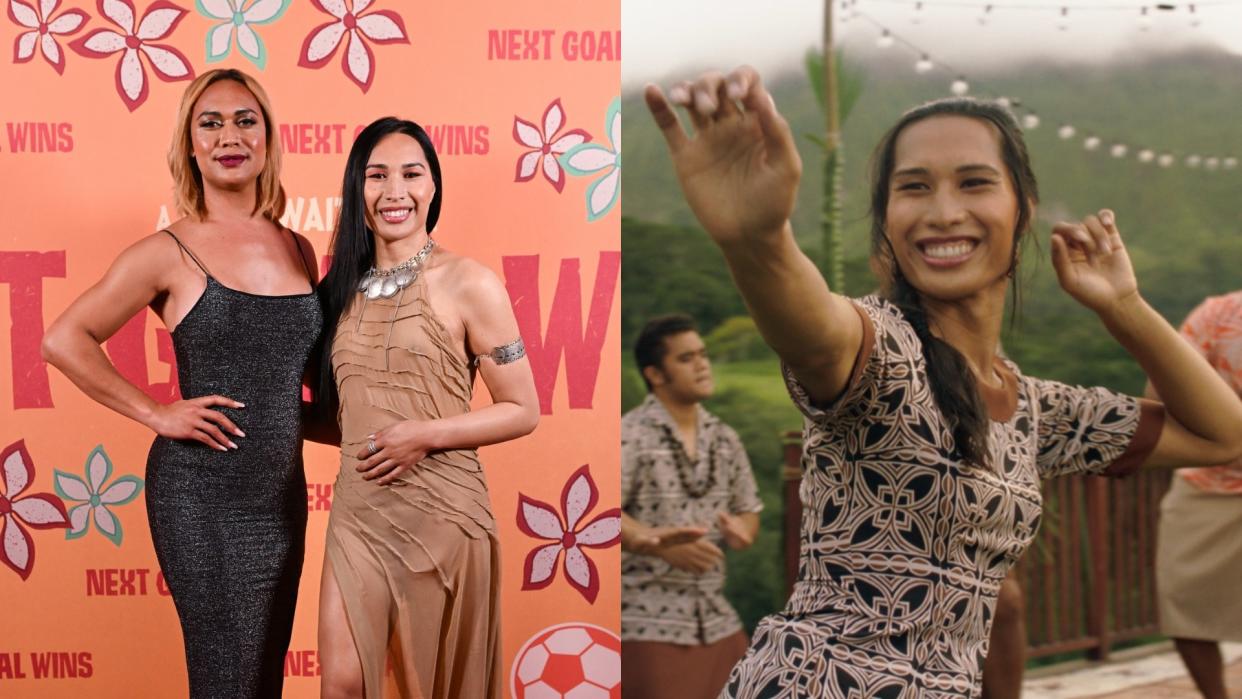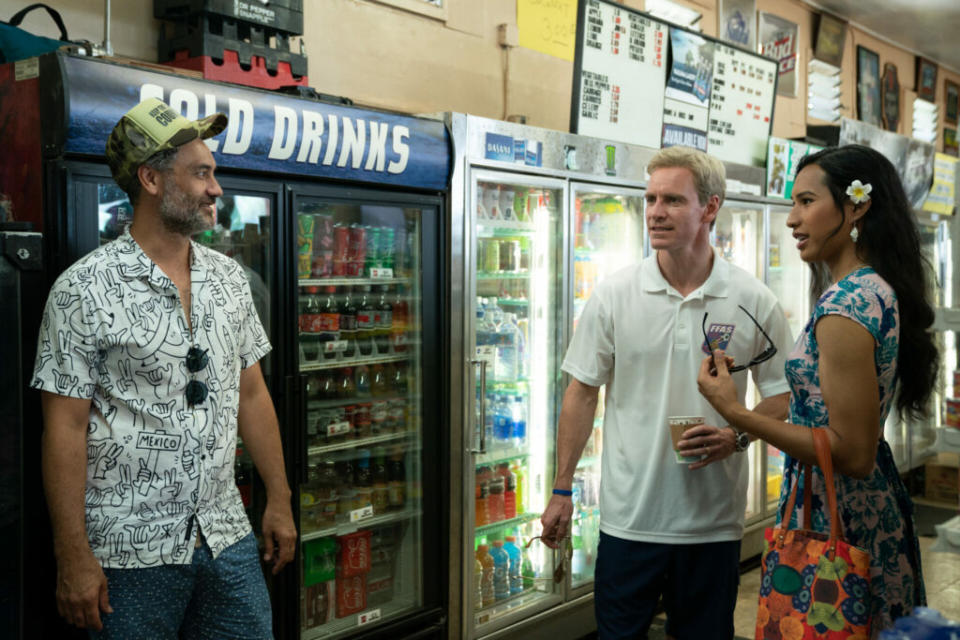Next Goal Wins: Meet the amazing trans footballer who inspired Taika Waititi’s new film – and the star who plays her

A Taika Waititi-directed movie with an authentically drawn and felt gender-diverse character at its heart was not on our pop culture bingo card for 2023 – but we’ll take it. The Thor actor’s new film, Next Goal Wins, tells the true story of the famously bad American Samoa soccer team who made global headlines in 2001 after losing a FIFA match 31-0.
This tale of the underdogs finds the team in 2014, with the World Cup Qualifiers approaching. One player credited with turning the team’s fortunes around was Jaiyah Saelua, who identifies as a trans woman and faʻafafine, a term meaning the “third gender” in Polynesian culture, according to the Samoa Fa’afafine Association. Playing Jaiyah in the film is Kaimana, who is also faʻafafine.
Elsewhere, Michael Fassbender plays their moody coach Thomas Rongen, while Taika – who won the Best Adapted Screenplay Oscar for Jojo Rabbit – pops up in a memorable cameo.
“Representation is everything,” says Jaiyah in an interview with Attitude, of the importance of a gender-diverse person playing her. “I think a lot of the social issues that we face, that we see on film nowadays, and how woke audiences are now – it’s important we represent people who are portraying actual people. And not only their experiences, but who they are and where they’re from.”
“We were really, really ecstatic about how the film came out,” Jaiyah adds. “Also, to see a trans person as a lead female role in Hollywood feature film… You don’t see that at all.”
Here, in an edited and condensed transcript of their conversation with Attitude, Jaiyah and Kaimana talk representation, filmmaking and their message for viewers who may be triggered by the film’s depiction of transphobia.

Could you describe your relationship? It must be a unique relationship when you’re playing someone, and someone’s playing you!
Jaiyah: It’s an actual friendship. We met at the launch party for the project.
Kaimana: The thing is, we’re both faʻafafine. It’s just, like, whenever you meet… it’s like instinct. There are so many commonalities. You recognise your own. There’s a camaraderie.
It’s lovely to hear how accepted gender-diversity is in your country. What is it like for other LGBTQ people? Is homosexuality as accepted?
Kaimana: It’s interesting, because within an indigenous framework, sexual orientation and the concept of gender, they actually don’t exist, technically. To try and talk about sexual orientation in the way, even if you try to speak about it within one of the Polynesian languages, it’s almost impossible. It’s very much a Western construct.
Jaiyah: When you try to translate it, it doesn’t mean the same.
Kaimana: We benefit coming from cultures with these ancient structures. No one thinks about them! If you’re faʻafafine, that’s who and what you are. No question about it. You’re recognised as that. The only time that there’s thoughts surrounding that is when you’re stepping into a Western context. Or, I should say, a language maybe rooted in our patriarchal structures. [Then] it becomes ‘a thing’.
Jaiyah: Your question suggests fa’afafine equates to trans, but it doesn’t. It’s also inclusive of gay men. Or anyone assigned the male gender at birth, but who lives their life otherwise. It doesn’t necessarily have to be someone who chooses to transition, or present as female. It’s nothing to do with that.

You’ve had an insight into the LGBTQ inclusivity situation in football cultures worldwide. In the UK, I’m disappointed by the slow progress. Any observations?
Jaiyah: The FA has done some work to be more inclusive of LGBTQIA+ athletes. I was on a panel of LGBTQIA+ athletes in 2016 discussing ways to change policies to make them more inclusive. But progress is slow. I would agree to that. It stems from society. But progress is inevitable. It’s going to happen, whether people like it or not. FIFA as a ruling body itself has done a lot of work over the past years. Especially in terms of changing the social climate that was left by Sepp Blatter and his administration.
Michael Fassbender’s character is depicted as prejudiced, initially. And that’s handled in quite a direct way. Do you have a message for gender diverse viewers who might be triggered by that?
Jaiyah: It was uncomfortable and cringe for me to see. But I also understand that it’s important that audiences outside of rainbow communities see that, because those are our realities. Those are experiences we face almost on the daily. As traumatising as they might be for us, it does have the power to give audiences a sense of empathy for our community. It might even help create allies for us.
Kaimana: She’s right. I think it’s important people are able to see realities. I think it’s important for these stories and realities to be portrayed in the correct hands. In a way, for me, it was cathartic. I’d never actually seen in a film or media platform an experience like that, which I have gone through. For people who are watching who are triggered – I understand. I would say, it’s OK. And you’ll be OK. In the grander scheme of things, what’s being portrayed in the project is absolutely going to benefit everyone at large. Don’t be afraid that this is going to be weaponised. If anything, this is only going to help.

What did you learn about acting, Kaimana, from working with Michael Fassbender?
Kaimana: I learned a lot about the craft, the art of acting by watching and observing him. Because, you know, I was just a lost little bee on set! I had no idea what I’m doing! I’d watch everyone, but particularly Michael. A look in his eyes where he would zone into the character. And I thought, OK, whatever that is, I need to do that too. He probably he probably doesn’t know this, but he was arguably my best teacher when it came to acting for sure.
Have you been able to get the responses to the film of any LGBTQ celebrities?
Kaimana: Well, I’m not on social media!
Jaiyah: I’ve told her she has to. She’s going to be a big person in the industry and needs to get herself out there! There were a few at the LA premiere. Laith Ashley and Arisce Wanzer, both from Strut. I’ve followed them and watched their career from the very beginning. It was so surreal to see them in-person at the afterparty for a movie that is about me!
Kaimana: I was like: “Arisce?! You know who I am?!”

How are your football skills now, Kaimana?
Definitely worse!
What’s next for you both?
Kaimana: We’ll see! I’m loaded on meetings right now…
Jaiyah: She’s for sure going to have a big career ahead. I’m coming to the end of my game-playing. I’ve been with the national team for more than 20 years. It’s weighing on my body. My knees are giving up and my bones are breaking every which way! But the passion to play is still there. I always want to be involved in football in some capacity. I’ve been venturing into getting my license with FIFA so I can hopefully coach a women’s national team. I tried the referee thing. I can’t do it! You can’t go from playing to refereeing!
What’s your message to the community who are watching your journeys and feel inspired, but feel downtrodden themselves?
Kaimana: Keep your chin up. Because things are getting better. The fact this project even exists is testament to the shift of the times. Keep looking forward. And look for the people who not only accept you but celebrate you. Be kind, be fierce, be true, be you.
Jaiyah: It’s easy to lose ourselves in the climate of things. I think as long as you stay true to yourself and know your passions, and stay true to those passions, and find spaces where you can pursue those passions and still be yourself… Because that was my privilege. I grew up in a place where I was able to be myself, but also pursue something that I was passionate about. So, if anybody in the world who feels they are held back by their communities, I would suggest – and it’s easier said than done – find a community that they can thrive in and just watch themselves blossom.
Next Goal Wins is in cinemas from 26 December 2023.
The post Next Goal Wins: Meet the amazing trans footballer who inspired Taika Waititi’s new film – and the star who plays her appeared first on Attitude.

